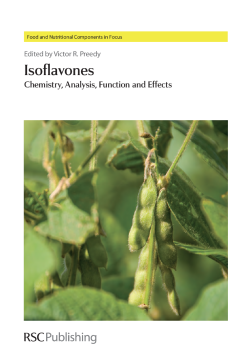
BOOK
Isoflavones
K Nara | N P Botting | P Kachlicki | J Malysz | R Baber | F Bucar | B H Chen | J Park | R Bolanos | R Priefer | M A. G. Koffas | Kristina Wahala | Y Vodovotz | Murray Mitchell | J P. E. Spencer | Francesco Squadrito | Yves Jacquot | K Ishii | Dorin Boldor | Rita C Alves | A Zafra-Gomez | Lei Wan | G K Jain | Daniel Scherman | O Kucuk | Sue K Park | Craige C Wrenn | J A Bomser | Joesph M Wu | Edwin L Lephart | R Huang | Paul B Tchouwou | Dongmin Liu | B T Akingbemi | Zhong Li | S Sehmisch | C Gercel-Taylor | Dra M Teresa Blay | Victor R Preedy
(2012)
Additional Information
Book Details
Abstract
Isoflavones remain the subject of many scientific studies most of which reveal them to have some health benefits. Coverage within this book begins with an overview of phytoestrogens in health and plants with specific reference to isoflavones, how isoflavones are found in the diet and novel compounds in nuts. Expert accounts of the chemical and biochemical research on this topic are provided followed by analytical and bioanalytical assessments. Rounding up the book are the chapters on function and effects of isoflavones which provide details on isoflavones in beverages, soy and soy products and other food delivery systems and how their function effects the thyroid, menopause, prostate, breast, bone and cardiovascular disease to name but a few. Delivering high quality information, this extensive and detailed book provides a fascinating insight into this area of health and nutritional science. It will bridge scientific disciplines so that the information is more meaningful and applicable to health in general. Part of a series of books, it is specifically designed for chemists, analytical scientists, forensic scientists, food scientists, dieticians and health care workers, nutritionists, toxicologists and research academics. Due to its interdisciplinary nature it could also be suitable for lecturers and teachers in food and nutritional sciences and as a college or university library reference guide.
Victor Preedy is currently Professor of Nutritional Biochemistry and Director of Genomics Centre, King's College London and Professor of Clinical Biochemistry at King's College Hospital London. After graduating with a BSc degree in Physiology with Pharmacology and Biology, Professor Preedy carried out a period of research on protein metabolism in the Department of Nutrition at the London School of Hygiene and Tropical Medicine. After the successful award of his PhD he studied aspects of cardiac protein metabolism at the National Heart Hospital. After 4 years, he then moved to the MRC Clinical Research Centre in Harrow, which was followed by his appointment as a lecturer to Kings College in 1988. He was promoted to Reader in 1995 and Professor in 2003. Professor Preedy has published over 550 articles, which includes over 160 peer-reviewed manuscripts based on original research and 90 reviews as well as 35 books.
